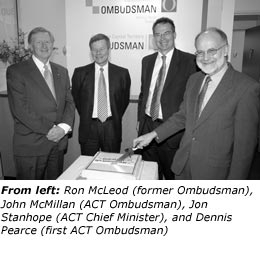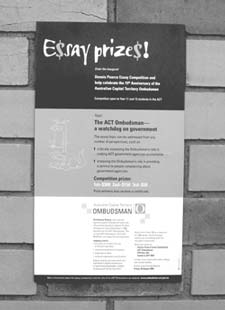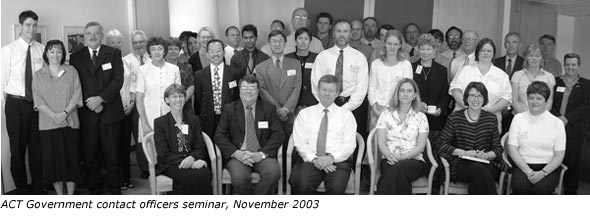Ombudsman overview
CHAPTER 1 | ombudsman overview
Introduction
 In June 2004, the ACT Ombudsman's office celebrated its fifteenth anniversary. The office was established as part of the framework for ACT self-government in 1989, and has been an enduring feature of the ACT system of government accountability and statutory oversight. Many thousands of ACT residents have approached the ACT Ombudsman over that period on matters as diverse as public housing, road traffic control, whistleblower protection, urban planning, child protection, schooling and correctional services.
In June 2004, the ACT Ombudsman's office celebrated its fifteenth anniversary. The office was established as part of the framework for ACT self-government in 1989, and has been an enduring feature of the ACT system of government accountability and statutory oversight. Many thousands of ACT residents have approached the ACT Ombudsman over that period on matters as diverse as public housing, road traffic control, whistleblower protection, urban planning, child protection, schooling and correctional services.
Building on the experience and insights gained from handling complaints, the ACT Ombudsman has been able to stimulate improvements across the breadth of government administration. Among the areas beneficially improved are the quality of decision making, internal complaint handling, transparency, record keeping, communication with the public, and sensitivity to individual needs. These aspects of public administration go to the heart of relations between government and the community. Equally, they have a strong bearing on the level of community confidence in the integrity and professionalism of government.
'Building on the experience and insights gained from handling complaints, the ACT Ombudsman has been able to stimulate improvements across the breadth of government administration.'
The fifteenth anniversary of the ACT Ombudsman provided an opportunity for the office to refresh and renew its commitment to the ACT community and government. As described elsewhere in this report, the opening of an ACT Ombudsman shopfront, the launch of an annual essay competition and the staging of a contact officers seminar formed the anniversary activities. Pleasingly, the ACT Chief Minister opened the shopfront and launched the essay competition.
KEY ACTIVITIES IN 2003–04
Complaint handling remains the core of the Ombudsman's role. During 2003–04 the office handled 955 complaints from the public. The complaint investigation role of the office is dealt with at length later in this report. We highlight some of the other activities of the office during the year in this chapter.
'Complaint handling remains the core of the Ombudsman's role.'
Opening of ACT Ombudsman shopfront
 A constant challenge for the office is to maintain a public profile and for the public to know they can turn to the office when problems with government agencies arise. An important step towards meeting this challenge was the opening of a shopfront in Canberra in June 2004. The opening was performed by the ACT Chief Minister, Jon Stanhope MLA, and was attended by two previous ACT Ombudsman and representatives from ACT Government agencies, the Legislative Assembly, and non-government organisations. The shopfront opening was also an event to mark the 15th anniversary of the office of ACT Ombudsman being established in 1989.
A constant challenge for the office is to maintain a public profile and for the public to know they can turn to the office when problems with government agencies arise. An important step towards meeting this challenge was the opening of a shopfront in Canberra in June 2004. The opening was performed by the ACT Chief Minister, Jon Stanhope MLA, and was attended by two previous ACT Ombudsman and representatives from ACT Government agencies, the Legislative Assembly, and non-government organisations. The shopfront opening was also an event to mark the 15th anniversary of the office of ACT Ombudsman being established in 1989.
The opening of a shopfront was an important event for the office, symbolically as well as practically. Most complaints, inquiries and approaches to the office come via telephone, mail or, increasingly, the Internet; however, the opening of a shopfront is an important step in reaffirming that public accessibility is a vital aspect of our work, and that visibility is a key component of our relationship with the public. It also signifies the continuing commitment of the office to be active in the community in dealing with problems that people encounter with government.
'The opening of a shopfront is an important step in reaffirming that public accessibility is a vital aspect of our work, and that visibility is a key component of our relationship with the public.'
To coincide with the opening of the shopfront, we refreshed the ACT Ombudsman logo and developed street signage. These steps have resulted in a marked increase in the number of complaints being made in person, as well as in the number of telephone and written complaints received. In the longer term, this should enhance public awareness of the existence and role of the office and the service it provides to the community.
 Inaugural Dennis Pearce Essay Competition
Inaugural Dennis Pearce Essay Competition
At the opening of the shopfront, the Chief Minister announced an inaugural essay competition for Year 11 and 12 ACT college students. The Dennis Pearce Essay Competition is named after Professor Dennis Pearce, who was the Commonwealth Ombudsman when the office of ACT Ombudsman was established, becoming the first ACT Ombudsman. Students were asked to address the topic of 'The ACT Ombudsman—a watchdog on government'; with entries submitted in August 2004. The essay competition will be held annually to raise awareness about the ACT Ombudsman's role.
Review of the ACT statutory oversight system
During 2003–04, the ACT Government initiated a review of the system of statutory oversight of government in the ACT. The Foundation for Effective Markets and Governance conducted the initial stage of the review, which was followed by a further round of public consultation.
My office made submissions at all stages of the review, and participated in discussions with those involved. Our submissions focused on the ACT Ombudsman's distinctive role in oversighting the actions of ACT Government agencies, as well as the long standing experience the office has developed in handling and resolving complaints from members of the public. The office is better placed to make this contribution by reason of the link between the Commonwealth and ACT Ombudsman offices. This link enables the ACT Ombudsman to draw on the tradition, profile, resources, experience, training capacity, and national and international connections of a larger office. It is also a cost-effective means of delivering a high quality service to the ACT community.
'The office is better placed to make this contribution by reason of the link between the Commonwealth and ACT Ombudsman offices.'
Our submissions to the review made a number of practical suggestions for integrating and harmonising the activities of the different oversight agencies in the ACT. We noted the need for those agencies to work together in receiving and transferring complaints and even jointly conducting investigations. Innovations that deserve consideration are the establishment of a clearinghouse function, and the co-location of oversight and complaint agencies. We also drew attention to the need to extend the role of the ACT Ombudsman in two particular respects: to confer a conciliation function on the Ombudsman; and to extend the Ombudsman's jurisdiction to cover complaints about the outsourced delivery of publicly-funded services.
Defining the Ombudsman's role in a contemporary setting
The Ombudsman's office, though well established, is part of a system of government that is undergoing constant change. Some of those changes impact on the work of the Ombudsman, requiring the office to reflect on its role in government. Several aspects of change arose in 2003–04.
The legislation establishing the offices of Commonwealth and ACT Ombudsman is broadly similar. It was framed in 1976, when the office of Commonwealth Ombudsman was established, and has not been reviewed in any comprehensive fashion. A review is currently being undertaken by the office, with a view to putting proposals to government for the enactment of a new Ombudsman Act. The ACT Government will be consulted in the course of this review. A prime objective of the review is to improve and modernise the legislative framework, so that it is once again a model for administrative investigation. It is not proposed to change the role of the Ombudsman.
A major role of the ACT Ombudsman is to handle complaints about the Australian Federal Police in performing its community policing role in the ACT. The legislative basis for that role is the Complaints (Australian Federal Police) Act 1981 (Cth). Reform of that legislative framework was proposed in a report in 2003 by the Hon. William Fisher, AO, QC, A Review of Professional Standards in the Australian Federal Police. The Ombudsman's office is contributing to a review within government of the Fisher Review and the framework for investigation of complaints against the police.
The Ombudsman's role in relation to policing also arose in a different light during the year. In June 2004, the Australian Government announced it would establish an agency to investigate corruption in law enforcement agencies, including the Australian Federal Police. An issue raised in public debate was the role of the Ombudsman in this respect. Our position, in broad terms, is that the Ombudsman should not be the chief agency responsible for investigating corruption allegations. However, there is a thread that links administrative misbehaviour and official corruption, and complaints about law enforcement action are sometimes made in strong and accusatory language. My office, both in its Commonwealth and ACT guise, is contributing to the discussions within government about the framework for investigation of corruption allegations.
Yet another aspect of the Ombudsman's role under discussion in the past year was the function conferred upon the office by the Public Interest Disclosure Act 1994 (the PID Act). The ACT Government released a discussion paper setting out options for a new public interest disclosure model for the ACT. My office expressed support for a model that would clarify the oversight role of the Ombudsman (together with the Auditor-General and the Commissioner for Public Administration) in handling disclosures made under the PID Act. Our view is that the prime responsibility for investigation should remain with the agency to which a disclosure relates, but the oversight agencies should be notified of a disclosure at an early stage so that a decision can be made as to how and by whom a PID disclosure is to be handled.
Privacy and Ombudsman investigations
A matter of concern to my office during the year was a determination of the Privacy Commissioner (Complaint Determination No 5 of 2004) that arose from an investigation by ACT Ombudsman staff. The Privacy Commissioner made a determination that an officer of the ACT Department of Justice and Community Safety had disclosed personal information to the ACT Ombudsman's office in a manner that breached Information Privacy Principle 11.1.
I disputed that suggestion in a submission to the Privacy Commissioner, and proffered the view that the disclosure by the ACT officer was both proper and authorised by the Ombudsman Act 1989 I also made the argument that it could have a chilling effect on Ombudsman investigations if government agencies were excessively constrained by the spectre of privacy breaches in conveying information to the Ombudsman's office (which is itself subject to strict secrecy and privacy obligations). The alternative, for the Ombudsman to issue a formal statutory notice to an agency when seeking information, would constrain the speed, flexibility and informality of Ombudsman investigations.
The Privacy Commissioner's Determination is at odds with my submission; it is a concern at which I propose to look at further, including by discussion with the Privacy Commissioner. One option is to seek statutory clarification of the discretionary capacity of a government agency to provide information to the Ombudsman without committing a breach of privacy laws.
Launch of ACT Integrity Policy
I was asked to launch the ACT Integrity Policy in March 2004. A particular strength of the Policy is that it creates a single integrity framework that deals in an integrated and comprehensive fashion with fraud control, anti-corruption, ethics and propriety in government. In doing so, the Policy demonstrates that no single structure or formula will guarantee integrity in government; it is rather the plurality of mechanisms that is important.
The development of the Policy is also a salutary reminder that it is necessary to establish a framework of rules and procedures to control fraud and corruption in government and to advance ethical behaviour. The ACT is fortunate to enjoy ethical and accountable government; its continuation rests on a practical commitment to the rules, principles and values in the Integrity Policy.
PERFORMANCE REVIEW
My office dealt with 955 complaints about ACT Government agencies and ACT Policing in 2003–04. These figures have remained at a fairly stable level over the last three years.
The principal performance measures for the Ombudsman are an assessment of complaints received and finalised, time taken to finalise complaints, and training and liaison contacts. An overview follows, with detailed information included in the 'Overall performance' section of this report.
Complaint trends
In 2003–04, there was a slight reduction in the overall complaints received about ACT Government departments and agencies and ACT Policing—955 complaints compared to 960 in the previous year.
There was a small increase in the number of complaints received about ACT Government agencies—452 compared to 447 last year. The trend in total complaints has continued to be fairly stable over the past three years.
The largest number of complaints about a single agency involved ACT Corrective Services, with 102 new complaints received in 2003–04 compared with 54 received last year. Other agencies that accounted for significant numbers of complaints included ACT Housing (93new complaints, down 32% from last year); Department of Education, Youth and Family Services (60 complaints, up 58%); and Road User Services (43 complaints, down 7%).
We also saw an increase in complaints about the ACT Magistrates Court (18 complaints compared to 11 last year) and the ACT Public Trustee (16 complaints compared to 7 last year); and a decrease in complaints about the Department of Urban Services (22 complaints compared to 36 last year). We received 29 complaints about the newly created ACT Planning and Land Authority.
For ACT Policing, there was a 2% decrease in complaints received (503 compared to 513 in the previous year). This follows a general decrease in the number of complaints made about ACT Policing over the past six years. Analysis of complaints received and finalised is provided in the Overall Performance section of this report.
Ombudsman seminars for ACT contact officers
The Ombudsman's office held two successful seminars during the year for contact officers in ACT Government departments and agencies. The first was held in November 2003, providing an overview of the Ombudsman's role. It conveyed an understanding of how our office handles and investigates complaints. The second seminar, held on 2 June 2004, looked at 'Moving beyond Defective Administration and Resolution' and focused on internal complaint handling by agencies and working with the Ombudsman's office to achieve resolutions. Both seminars were well attended, and positive feedback was received from participants about the importance and usefulness of the seminars.

Submissions
Through its complaint handling and investigation work, the Ombudsman's office comes into contact over time with most aspects of ACT Government. As stated in our Strategic Plan for 2003–04, we see it as a distinct role of the Ombudsman to 'contribute to public discussion on administrative law and public administration' and to 'foster good public administration that is accountable, lawful, fair, transparent and responsive'.
In furthering these objectives, my office made submissions to or commented on a range of administrative practice matters and legislative proposals during the year:
- the discussion paper on a Disability Services Commissioner
- the review of the Children and Young People Act 1999
- The Territory as Parent—Review of the safety of children in care in the ACT and of ACT Child Protection Management (the Vardon Report)
- the report of the ACT Bill of Rights Consultative Committee, Towards an ACT Human Rights Act
- the review of the Public Interest Disclosure Act 1994
- the Economic White Paper for the Australian Capital Territory
- the draft Government Procurement (Quotation and Tender Thresholds) Guideline 2003 and the Justice and Community Safety Legislation Amendment Bill 2004
- a draft policy on the Acceptance of Non-Domestic Waste (Trade-Waste) into the Sewerage Network
- the review of the system of statutory oversight of government in the ACT.
OUTLOOK FOR 2004–05
New Memorandum of Understanding
We are currently negotiating a new five-year Memorandum of Understanding with the ACT Government for the Commonwealth Ombudsman to continue to fulfil the role of ACT Ombudsman. Initial discussions have considered future impacts such as a new prison for the ACT, the increase in Public Interest Disclosure complaints, the volume and complexity of complaints about ACT government agencies, and complaints about community policing.
ACT Government agencies
Some areas of concern to be looked at in the coming year for ACT Government departments and agencies include:
- treatment of ACT Housing clients
- conditions at the Belconnen Remand Centre; for example, overcrowding, opportunities to exercise and undertake other activities
- development of an ACT scheme for compensation for detriment caused by defective administration
- matters concerning the temporary registration of motor vehicles, including the duration and cost of registration for vehicles needing repair to gain a roadworthy certificate, the extension of temporary registration, and the review of decisions about temporary registration.
ACT Policing
This year there was an increase in 'customer service' complaints about the AFP in its ACT community policing role, particularly relating to the issuing of Traffic Infringement Notices (despite total complaints about police declining). Ombudsman staff are continuing to work with the AFP to develop communication strategies for police officers when issuing traffic notices to allow the public to offer explanations for their driving behaviour.
The Law Enforcement Team and the ACT Team conducted outreach activities with the communities of Wreck Bay and Jervis Bay during 2003–04. We will continue to develop links with a wide range of community groups throughout the coming year, particularly those groups with a large number of clients from disadvantaged and minority sectors such as the multicultural, Indigenous Australian, youth, gay and lesbian sectors, and those with mental health problems.
In conclusion …
The ACT Ombudsman Annual Report 2003–04 is available on our website at www.ombudsman.act.gov.au. This online report offers more than a simple copy of a printed report. For the first time, our annual report has been developed as an online publication with improved usability and accessibility in line with government standards.
This year's annual report covers a range of different activities on which the Ombudsman is able to report, among them: how complaints against government were handled, the response by ACT Government agencies to accountability requirements, issues in ACT policing, and options for revising the statutory oversight system in the ACT.
This has been a vibrant year for the ACT Ombudsman. That it has been so is a sign of the value an Ombudsman's office can add to government and the community.
Prof. John McMillan
Australian Capital Territory Ombudsman
